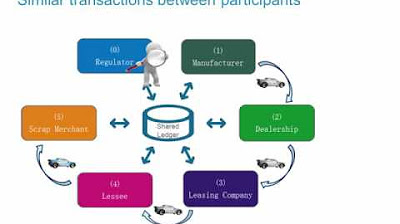US cracks down on transshipment in Southeast Asia to curb China tariff evasion
Summary
TLDRThis video explores how blockchain technology is revolutionizing logistics, particularly in Singapore, where it helps track shipments and prevent fraud. The industry has been slow to adapt due to reliance on outdated systems, but change is essential for efficiency and transparency. Amid the US-China trade tensions, countries in Southeast Asia, like Vietnam, are under pressure to prevent tariff evasion. Blockchain’s role in digitalizing supply chains could curb fraud and improve trade compliance, ensuring a more secure global market.
Takeaways
- 😀 Blockchain technology is being used in logistics to enhance transparency and prevent manipulation of shipment data.
- 😀 Logistics is moving towards a digital future, reducing reliance on outdated methods like paperwork, clipboards, and fax machines.
- 😀 Singapore’s logistics terminal leverages blockchain to track goods more efficiently and reduce errors in global supply chains.
- 😀 Andrew McCuran’s platform aims to digitalize supply chain management, addressing the industry's longstanding issues with paperwork and human error.
- 😀 Resistance to digital change in logistics may be driven by vested interests in maintaining the current, more manual processes.
- 😀 Singapore is a major transshipment hub, playing a crucial role in global supply chains, especially in the context of the US-China trade war.
- 😀 The US is pushing for Southeast Asian countries to enhance enforcement to prevent tariff evasion through transshipment hubs.
- 😀 The US-China trade war led to a significant drop in goods exports from China, but much of it was hidden through improper accounting in third countries like Vietnam and Thailand.
- 😀 Despite efforts to prevent trade fraud, services to help businesses evade export duties are still being advertised on Chinese social media.
- 😀 Experts warn that addressing trade fraud requires significant capacity building, and many countries need to strengthen enforcement to avoid trade sanctions from the US.
Q & A
What is the role of blockchain technology in logistics?
-Blockchain technology is used to record goods transactions, making it easier to track shipments and ensuring that information like the source of origin cannot be manipulated.
Why is the logistics industry often criticized?
-The logistics industry has been criticized for being reliant on outdated methods, such as paperwork, and for being prone to human error, which can lead to inefficiencies and inaccuracies.
What are the advantages of digitalizing logistics?
-Digitalizing logistics can improve efficiency by reducing human error, streamlining processes, and enhancing transparency in supply chain management, which can lead to better compliance and accountability.
How does Singapore contribute to the global supply chain?
-Singapore is the world’s largest transshipment hub, playing a critical role in global trade by efficiently handling and routing goods through the region, ensuring compliance with trade regulations.
What issue is currently at the forefront of U.S. trade concerns?
-The U.S. is focused on ensuring that Southeast Asian countries, particularly those serving as transshipment hubs, are preventing the circumvention of tariffs, which has been an issue in trade with China.
How has the U.S.-China trade war impacted global trade?
-The U.S.-China trade war resulted in a decline of around $240 billion in goods shipped from China to the U.S., with concerns about improperly accounted goods entering the market through third-party countries.
What are the consequences of improperly accounted goods entering markets?
-Improperly accounted goods can undermine tariff policies and trade regulations, potentially resulting in financial losses and unfair competition, while also complicating enforcement of trade laws.
What role do social media platforms play in trade evasion?
-Chinese social media videos have been advertising services that help businesses evade export duties, highlighting the ongoing challenge of enforcing trade compliance in the region.
Why are experts skeptical about Vietnam’s ability to crack down on trade fraud?
-Experts are skeptical because cracking down on trade fraud requires substantial capacity-building and resources, and the effectiveness of enforcement remains uncertain despite political promises.
What could be the consequences for countries failing to enforce trade regulations effectively?
-Failure to enforce trade regulations could lead to significant sanctions on trade imposed by the U.S., further complicating international relations and trade dynamics.
Outlines

Этот раздел доступен только подписчикам платных тарифов. Пожалуйста, перейдите на платный тариф для доступа.
Перейти на платный тарифMindmap

Этот раздел доступен только подписчикам платных тарифов. Пожалуйста, перейдите на платный тариф для доступа.
Перейти на платный тарифKeywords

Этот раздел доступен только подписчикам платных тарифов. Пожалуйста, перейдите на платный тариф для доступа.
Перейти на платный тарифHighlights

Этот раздел доступен только подписчикам платных тарифов. Пожалуйста, перейдите на платный тариф для доступа.
Перейти на платный тарифTranscripts

Этот раздел доступен только подписчикам платных тарифов. Пожалуйста, перейдите на платный тариф для доступа.
Перейти на платный тарифПосмотреть больше похожих видео

AI in Logistics - Top Trends in 2025 | AI for Logistics | How to Use AI in Logistics?

Blockchains: how can they be used? (Use cases for Blockchains)

Course 1: Blockchain Asset Transfer

IBM and Maersk Demo Blockchain Cross-Border Supply Chain Solution

OM/SCM - Blockchain Technology

Penerapan Fisika (Elektromagnetik) dalam Bidang Logistik
5.0 / 5 (0 votes)
